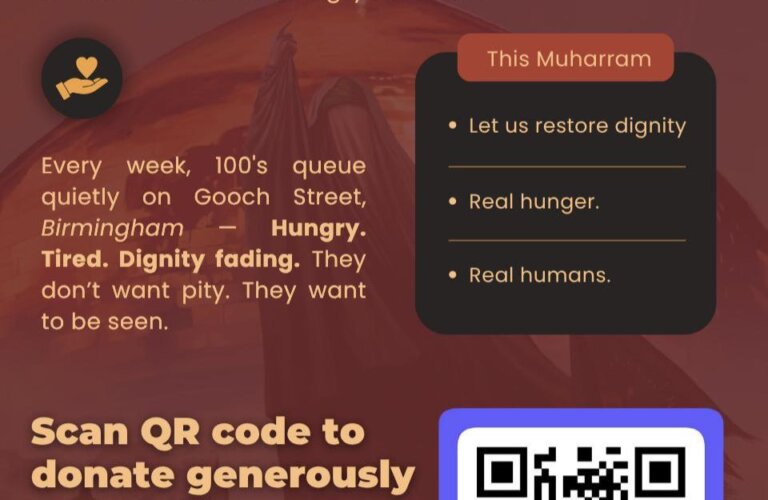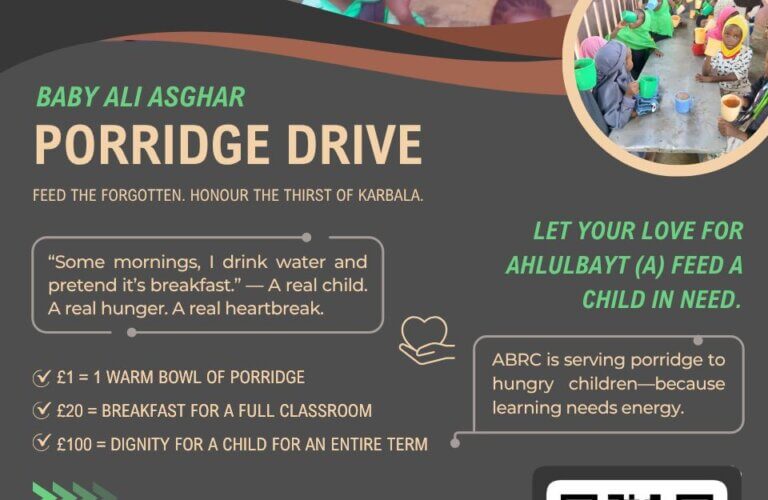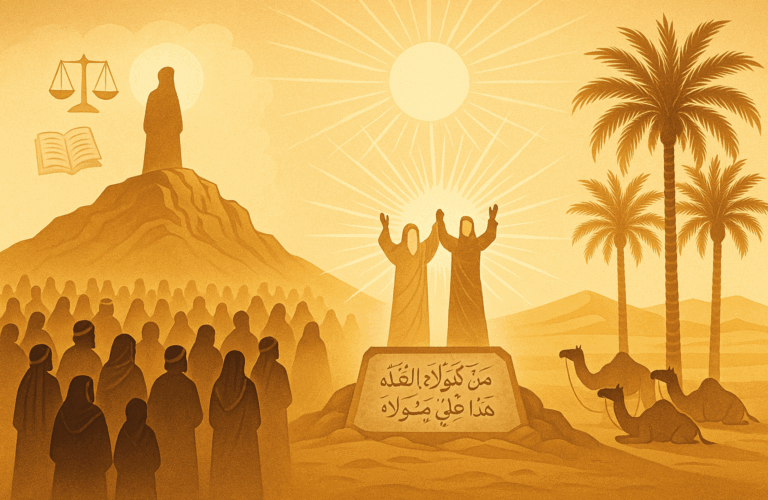By: Syeda Mehr Mustafa
Reading time: 5 minutes
The Sahifah al-Sajjadiyyah (The Book of Al-Sajjad) by Ali ibn Husayn has great significance in the Islamic intellectual and spiritual tradition as the first book ever written and compiled by a Twelver Imam. In fact, it is regarded as the “oldest” systematic “prayer handbook” in Islam[1]. A mystical treatise covering a remarkable depth and breadth of the human condition: whether psycho-spiritual, socio-political, legal or economical.
A book of psalms singing the praises of Divine Unity (Tawheed). It appeases the curiosities of those wanting to know their God, only to exasperate their limits of intellectual and spiritual knowledge. Leaving them transfixed in awe, wonder and amazement:
“Intellects fail before the core of knowing Him,
Tyrants fall low in awe of Him,
Faces are humbled in fear of Him,
And everything mighty yields to His mightiness
So to Thee belongs praise, again and again, well-measured, continually, methodically!”
[The Supplication for Monday]
A book of cosmic anthropology and spiritual psychology – guiding believers to explore the universe within and around them, only to converse upon a Singular Reality:
“Praise belongs to Allah,
The First, without a first before Him,
The Last, without a last behind Him.
Beholder’s eyes fall short of seeking Him,
Describers’ imaginations are not able to depict Him.
He originated the creatures through His power with an origination,
He devised them in accordance with His will with a devising.
Then He made them walk on the path of His desire,
He sent them out on the way of His Love.
[In Praise of Allah, supplication no.1]
Yet this book of electrifying spirituality, sparking excitement and tranquillity simultaneously – is the creative product of the most tremendous trauma in Islamic history.
Karbala.
A one-day massacre of Al-Husayn’s army by the ruling caliph and the subsequent captivity of the remaining members of the Holy Prophet’s (S.A.W) family.
During the battle of Karbala and in its aftermath, the grandchildren of the Holy Prophet (S.A.W) were subjected to inhumane atrocities and war crimes such as starvation, thirst, extreme weather, torture and humiliation. Al-Sajjad, as the last living son of Al-Husayn and the inheritor of his walayah and imamah, was especially persecuted and forced to witness the suffering of women and children under his care.
Despite bravely resisting and securing dignified release from the tyrannical Umayyad Empire, the trauma of Karbala remained with him throughout his life. Even twenty years after Karbala, he would weep whenever food was in front of him.
When someone asked: “O son of Allah’s Messenger! Is it not time for your sorrow to come to an end?”
He replied: “Jacob the Prophet had twelve sons, and Allah made one of them disappear. His eyes turned white from constant weeping, his head turned grey out of sorrow and his back became bent in gloom [referring to the Quranic verse 12:84], though his son was alive in this world. But I watched while my father, my brother, my uncle and seventeen members of my family were slaughtered all around me. How should my sorrow come to an end?”[2]
When asked what the most difficult part of his life-long ordeal was, Al-Sajjad replied: “As-shaam, as-shaam, as-shaam”, referring to the torture, humiliation, and deprivation that the women and children of the Holy Prophet’s (S.A.W) household faced in Damascus.
Yet while his socio-political externalities were tyrannical, unjust and inhumane – his esoteric, inner realities remained deeply embroiled in the loving worship of an even more Loving and Compassionate Allah. Al-Sajjad’s internal struggle is deeply marked by yearning for Allah and Allah’s blessing. It is a struggle that sees beyond the temporal realities of people and experiences around him and finds Allah within every socio-political-familial relationship:
“O Allah, bless Muhammad and Muhammad’s household
And replace for me:
The animosity of the people of hatred with [your] love,
The envy of the people of insolence with [your] affection,
The suspicion of the people of [your] righteousness with trust,
The enmity of those close with [your] friendship,
The disrespect of womb relatives with [your] devotion,
The abandonment of relatives with [your] help,
The attachment of flatterers with love set right,
The rejection of fellows with [your] generous friendliness,
And the bitterness of the fear of wrongdoers with the sweetness of [your] security”
[His Supplication on Noble Moral Traits and Acts Pleasing to Allah (Muqaram al-Ikhlaq)]
According to S.H.Jafri in his Foreword to William Chittick’s translation of the Sahifah:
“Zayn al-Abideen was a person who found himself caught up in the din and clamour of his life, in the clash of emotions and interests, in the stress and strain of immediate impulses, in the tensions and calamities of existence”.
Through the Sahifah’s emphasis on Allah’s overwhelming Mercy, one can witness both the depths of human despair and divinely bestowed peace upon the spiritually wayfaring soul.
Despite undergoing immense oppression and the helplessness of captivity, destitution and mistreatment – his resilience and unwavering faith in Allah’s Supreme Mercy are evident in the Sahifah’s attitude towards Allah’s wisdom and the human condition:
“Thou hast lauded Thyself for having no need for Thy creatures,
And it suits Thee to have no need for them,
And Thou hast attributed to them poverty,
And it suits them to be poor toward Thee.
So he who strives to remedy his lack through what is with Thee
And wishes to turn poverty away from himself through Thee
Has sought his need in the most likely place
And come to his request from the right quarter.
But he who turns in his need toward one of Thy creatures
Or assigns the cause of its being granted to other than Thee,
Has exposed himself to deprivation.
[His Supplication in Seeking Needs from Allah, supplication no.13]
Herein, it is clear that Al-Sajjad’s soul has the ability to transform the pain inflicted upon his externalities to innermost and steadfast devotion in worship and spiritual wayfaring. Al-Sajjad’s modalities [eyes, ears, heart, limbs, etc.] are sites upon which oppressors afflicted a thousand merciless wounds. Yet, he transforms them into organs whose melodies praising Allah’s Mercy, Love, and Compassion have become a timeless orchestra. The soundtrack to spiritual ascension for over fourteen hundred years.
While he is in chains lined with steel nails brought before many a tyrannical ruler and administrator – his soul is free, submitting joyfully only to Allah: The Sovereign, The Supreme. Challenging the very wounds inflicted upon him by remaining unaffected by them, both spiritually and psychologically. The only effect of human evil, trauma and suffering upon him – is that they intensified his belief in Allah’s Limitless and Eternal Mercy.
Through Al-Sajjad’s navigation, articulation and expression of his own devotion amidst trauma – he paves the mystical way for our broken hearts, fractured resilience and wavering faith towards The One. He teaches us how to challenge the tyranny within and around us.
Most prayers are for those who suffer – suffer from fear, anxiety, abasement, heedlessness and a lack of direction. They show his unparalleled understanding of human nature – its burdens, its grief, its joys and the light that shines within all of us by the Grace of Al-Khaliq (The Creator), Who is also Al-Nur (The Light). By aligning each psycho-spiritual state with the relevant understanding of Allah’s Divine Unity (Tawheed) – Al-Sajjad teaches us how to transform trauma from wounds that poison our hearts, numb our consciousness, blind our sights with rage to wounds that purify our hearts, clarifies our intellects, lifts all veils, and gives wings to our souls.
How strange – to hear that trauma not only heals but saves us. But such is the transformative, creative power of Al-Sajjad’s wisdom and endurance. He not only ascends to the perfection of rectitude within himself despite his suffering but leaves for us in the form of the Sahifah al-Sajjadiyyah a guide, a friend, a healer, a helper which lifts the fitrah from the depths of traumatic despair to the heights of knowledge, love and worship.
The author has a M.A Islamic Studies from George Washington University, with her research focusing on Al-Sajjad’s life and the Sahifah al-Sajjadiyyah.
[1] pp. 378. Al-Qarashi, Baqir Sharif. 2000. The Life of Imam Zayn al-Abidin. Translated by Jasim al-Rasheed. Qom: Ansariyan Publications.
pp. xv. Chittick, William. 1988. “Introduction.” In The Psalms of Islam: Al Sahifat Al-Kamilat Al-Sajjadiyya, by Ali ibn al-Husayn, translated by William Chittick, xv-xliv. London: The Muhammadi Trust of Great Britain and Northern Ireland.
[2] pp. 195. From Shaykh as-Sadooq, al-Khisal; quoted in al-Ameen, A’yan, IV.
pp. 108. Bin Shahraashoob’s Manaqib in Bih’ar al-Anwar by Allama Malisi, XLVI.
Similar accounts in Bih’ar al-AnwarXLVI, pp. 108-10.





Beautifully articulated. Indeed the words of the Imam have the power to open our eyes to the infinite mercy of Allah and cleanse our hearts of sorrow while treading that path.
Thank you so much for taking your time reading this thought-provoking article and tapping into the du’as from Imam Sajjad a.s especially right now when our humanity is going through pain and a roller coaster of emotions. Healing can only happen when our hearts turn to Allah swt
This article is one of the few I have read on the Sahifa. Mashallah a work of devotion and intellect.
Bless you noble brother.
Jazakumullah khayrah. Please keep sharing this article to Godly souls who is real quest and in search of self discovery and self- transformation.
Lovely foreword to the Sahifa asSajjadia!
Thank you so much dear soul sis. ❤️
Please keep sharing and supporting our beautiful vision and objectives.
Good to see young people writing about Sahifah e Sajjadia. The atrocities faced by the Imam were phenomenal and our younger generation needs to know lot more on the tolerance and patience shown by Imam Sajjad.
A very nicely written article but a lot more is needed on this subject.
What a wonderful read. We come across few articles that leave a profound impact on us. Truly, the Sahifa Al Sajjadiya is a remedy for all the traumas and ailments that afflict us mortals.
This was a fascinating and thought provoking read. Thank you for adding to my knowledge. Beautifully done.
Assalam o Alaikum :
Thanks my dear sister for sharing such an intellectual and thought-provoking article with full of knowledge wrapped with du’as from Imam Sajjad a.s. especially right now when our humanity is in declining day by day. It really invites us to turn to Allah swt, the only way to heal the sensitive hearts of Momineen.
Ma sha Allah, wonderfully written article with devotion, intellect and total resolve. A gift for Godly souls who are in real quest and in search of self-discovery and self- transformation.
It’s infact source of inspiration for young people, the way Miss Mehr Mustafa took this initiative, writing about Sahifah e Sajjadia. The difficulties and atrocities faced by Imam a.s. were phenomenal and our younger generation needs to know lot more on the tolerance and patience shown by Imam Sayyad e Sajjad a.s.
I don’t know whether I have seen her or not but now after reading this touching n thought provoking article I wish to see my Bhanji, the young scholar Mehr as it leaves a profound impact on me. Truly said by someone that the Sahifa e Al-Sajjadiya is a remedy for all the traumas and ailments that distress our souls and body both.
Thanking once again for sharing this nicely written intellectual article and providing me an opportunity to put across my viewpoints (though may not be valuable) on it but I urge Mehr to continue writing as still a lot need to be written on such like subjects.
Regards,
Naseer from Lahore